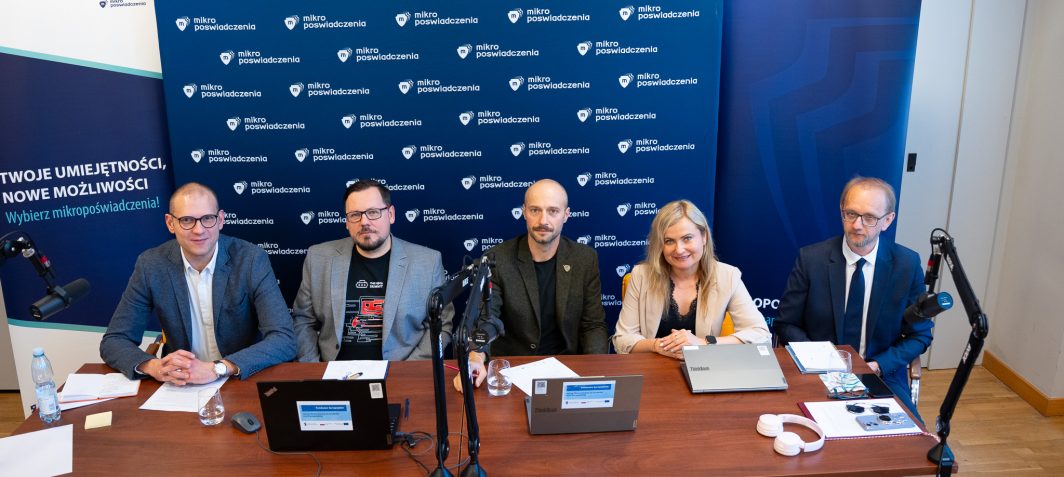
Solutions to ensure the quality of microcredentials
The Educational Research Institute – National Research Institute (IBE PIB) continues its work on the development of a microcredential system. Over recent months, efforts have focused on designing solutions that will guarantee their quality. Drawing on best practices and the experience of other experts specialising in certification systems and quality assurance mechanisms remains a key element of developing the standards.
Foundations of the microcredential system
The values, principles, tools, and mechanisms supporting the quality of microcredentials within the system were the focus of the sixth meeting of the MicroCredentials Advisory Group, held on 27 May 2025.
‘Over the past six months, the IBE project has carried out intensive work to develop appropriate solutions ensuring the highest quality of microcredentials issued within the system,’ said Dr Wojciech Stęchły, lead expert on the design of digital solutions for skills development in the project ‘Microcredentials – piloting a new solution to support lifelong learning.’
During the meeting, participants were introduced to proposals concerning the accreditation process for credential issuers within the system, as well as the challenges related to the use of external recommendations in evaluating issuers’ activities.
‘Microcredentials play a key role in promoting a culture of microlearning, which supports the flexible and continuous development of qualifications. Their quality and credibility depend on clearly defined standards and innovative methods of validating educational achievements. During the meeting, the importance of building trust in microcredentials as carriers of specific, measurable learning outcomes was highlighted. Only in this way can they genuinely support professional and personal development and respond to the dynamic needs of the labour market,’ commented Szymon Kurek, expert at the Polish Agency for Enterprise Development.
Members of the Microcredentials Advisory Group also learned about the current stage of work on improving the Odznaka+ application, which is being developed as a tool for issuing and collecting digital microcredentials.
MSUES – valuable experience in quality assurance
A particularly inspiring part of the meeting was a presentation by Justyna Falgier, Head of the Quality and Audit Team at the Voivodeship Labour Office in Kraków, who spoke about experiences in building a quality assurance system based on the Małopolska Educational and Training Services Standards (MSUES) example. According to the assumptions of this system, standards are essentially a verifiable quality benchmark developed as a compromise between the stakeholders in the training services market. Crucially, at the heart of the MSUES concept are the training providers’ clients and their needs.
Justyna Falgier shared insights into quality assurance within the Małopolska system and offered guidance for the experts developing the microcredential system at the Educational Research Institute.
‘The quality of validation within the microcredential system cannot be accidental. It must be grounded in quality management principles and planned according to clear criteria and consistent procedures. The professionalism of experts, as well as the transparency and impartiality of the process, are the foundation of trust in microcredentials. Regular evaluation will help verify whether the intended processes are being implemented effectively and whether users understand and perceive them as fair. Only through continuous improvement based on data and stakeholder involvement, including employers, can microcredentials become a genuine tool for skills development,’ emphasised Ms Falgier.
Experts at IBE PIB can draw on the experiences of, among others, the creators of MSUES, to develop an effective quality assurance system for microcredentials. However, as Dr Wojciech Stęchły points out, there are certain differences that must be taken into account.
‘The most commonly used quality assurance mechanisms for degree programmes or extensive development services (such as comprehensive training schemes) are typically far more elaborate than what is necessary in the case of microcredentials. For microcredentials, it is particularly important to focus on the issuer and their readiness and capability, while also providing support and requiring continuous improvement. We are not abandoning microcertification evaluations,’ emphasised Dr Stęchły.
Participants in the meeting included:
Bogusław Dębski, Sectoral Skills Council for IT
Szymon Kurek, Polish Agency for Enterprise Development (PARP)
Małgorzata Lelińska, Lewiatan Confederation
Agnieszka Majcher-Teleon, Ministry of Family, Labour and Social Policy
Agnieszka Dec, Ministry of Funds and Regional Policy
Barbara Worek, Sectoral Skills Council for Development Services
